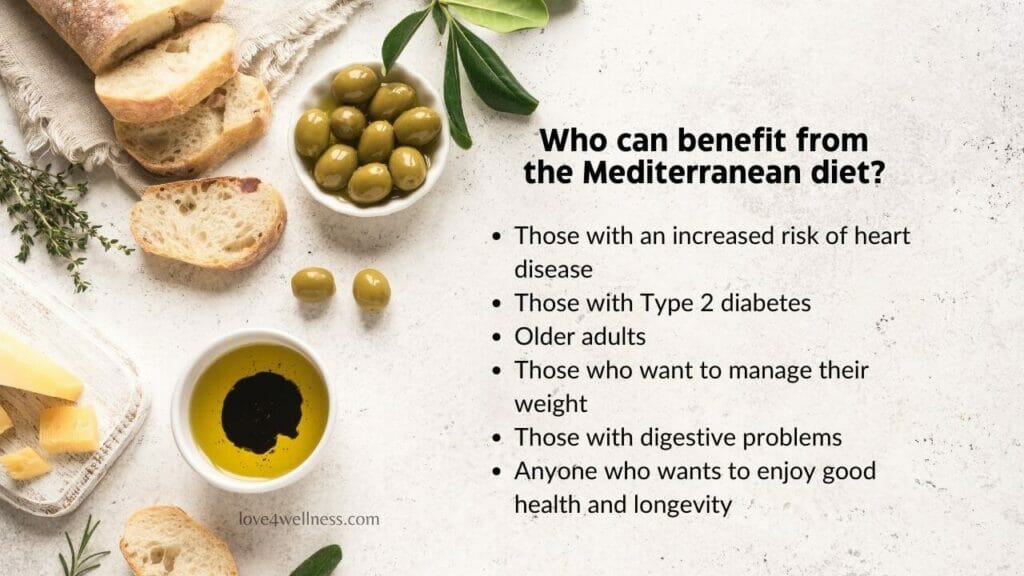There’s no dearth of diets, each claiming different health benefits such as weight loss, better management of lifestyle diseases, overall health, graceful ageing, etc. And the Mediterranean diet has stood the test of time, remaining relevant in the past and the present and will in future as well. The Mediterranean diet is not too restrictive, is sensible, and, importantly, offers many health benefits.
A Mediterranean diet is based on the traditional foods and cooking styles of countries surrounding the Mediterranean Sea, including Italy, Greece, Spain, and others. The diet advises the consumption of fruits, vegetables, whole grains, nuts, seeds, etc., along with healthy fats such as olive oil and fish. Fish is the main source of animal protein instead of red meat, pork, or poultry. Unprocessed dairy is consumed in moderation, and the diet is low in processed foods, refined sugars, and saturated and trans fats.
Here are some of the key components of a Mediterranean diet
The Mediterranean diet is not only healthy but also simple because it is not strict, allows you to enjoy your eating, and the plate is filled with wholesome foods that won’t leave you craving satisfying food. A simple rule to plan your plate of Mediterranean diet is to half-fill with colourful vegetables and fruits, one-quarter with whole grains, and the other quarter with healthy protein.
The following are the key components of a Mediterranean diet and the recommended portion sizes per day.
i) Lots of fruits and vegetables
The diet emphasises consuming various colourful fruits and vegetables, which are an excellent source of dietary fibre, high in antioxidants, and full of vitamins and minerals.
A general recommendation is a minimum of 4 servings of vegetables per day, of which one portion is raw vegetables. And aim for three servings of fruits every day.
ii) Whole grains
The diet includes whole grains such as brown rice, whole wheat pasta, and quinoa, a good source of fibre, vitamins, and minerals.
It is good to include whole grains in every meal as they provide the needed macros to keep you energetic. Recommended is 3-6 servings per day.
iii) Healthy fats
Olive oil is the primary source of fat in a Mediterranean diet. In addition, foods that are naturally high in healthful fats, such as avocados, nuts, seeds, and oily fish like salmon and sardines, are stressed. Among these, fish and walnuts are high in omega-3 fatty acids.
Four to five tablespoons of olive oil per day. About 25 mixed nuts, 2-3 teaspoons seeds, and fish twice a week.
iv) Fish
Fish is the main source of protein and is swapped for other animal protein sources such as red meat and poultry. Fish is a high-quality, low-fat protein. It is also rich in omega-3 fatty acids, vitamins D and B2 and is a great source of certain minerals as well.
Recommended consumption is twice a week.
v) Low to moderate consumption of dairy products
Cheese and yogurt are common in a Mediterranean diet but in moderate amounts. Choose unprocessed cheese over processed ones. Other dairy products, including milk and butter, need not be restricted but consumed in moderation.
At most, 2-3 servings a day, which may look like a cup of fermented yogurt and some cheese or a cup of sugarless tea and a cup of yogurt.
vi) Red meat, poultry and eggs in moderation
Though sources of complete protein, red meat, poultry and eggs are not recommended daily because these foods may increase LDL and total cholesterol, increasing the risk of heart diseases.
Unprocessed red meat – a few times a month. Eggs – 2 to 4 eggs per week. Poultry – 3 ounces portion per week.
vii) Limited consumption of processed foods
The Mediterranean diet emphasises whole, unprocessed foods and limits the consumption of sweets and processed and packaged foods.
Avoid processed foods as much as possible. You may consume sweets in moderation.
Also Read:
Health benefits of a Mediterranean diet
A Mediterranean diet is a balanced and healthy way of eating that can provide various health benefits. Some of these include:
Reduced risk of heart disease
The diet is rich in heart-healthy foods like fruits, vegetables, whole grains, nuts, and olive oil and low in saturated and trans fats. Hence, it improves heart health. A study found that people following the diet had 24% less risk for cardiovascular disease, and women who adhered to the diet had a lower risk of stroke.
Improved brain function
High levels of antioxidants may protect against damage to brain cells associated with Alzheimer’s. Since the Mediterranean diet emphasises a high intake of fruits and vegetables, it improves cognitive function and reduces the risk of Alzheimer’s disease and dementia.
Lowered risk of cancer
The diet is rich in antioxidants and anti-inflammatory foods, which can help reduce the risk of cancers like breast and prostate cancer.
Better weight management
The Mediterranean diet is not a low-calorie diet but is rich in nutrient-dense foods that can help promote a healthy weight. In addition, the diet limits processed and high-fat foods linked to weight gain and hence is helpful in better weight management.
Improved digestive health
The diet is rich in fibre, which can help to promote digestive health and prevent constipation. Further, studies show that the diet reshaped gut microbiota, which positively impacts digestive health. Interestingly, a healthy gut microbiome is linked to improved heart health, better emotional health, and even improved cognitive functions.
The Mediterranean diet consists of many plant-based foods, unlike the western diet, which mostly comprises red meat and processed foods. Such plant-based foods produce fermentation metabolites, indirectly helping improve the gut microbiome.
Reduced risk of diabetes
Studies have shown that following a Mediterranean diet can help improve insulin sensitivity and prevent the risk of developing type 2 diabetes. It also reduces inflammation and hence may help improve conditions such as arthritis. As you may know, chronic inflammation eventually leads to diabetes. A regular Mediterranean diet in obese and overweight individuals with prediabetes can delay or stop progress to diabetes.
Increased longevity
Research has found that people who follow a Mediterranean diet have a longer life expectancy than those who don’t.
Here are some sample recipes that incorporate Mediterranean diet principles
Knowing the benefits of the Mediterranean diet, you would naturally be interested to learn a few recipes. Many awesome cooking websites would have a plethora of recipes. Google and try them—nevertheless, here are some quick sample recipes. Here you go.
- Lentil Soup:
- Cook lentils with onions, garlic, carrots, and celery in vegetable or chicken broth. Add turmeric and cumin while cooking for flavour. Serve with a drizzle of olive oil.
- Chickpea Curry:
- Cook chickpeas with onions, garlic, and ginger in a tomato-based sauce. Add turmeric, cumin, coriander, and garam masala for flavour. Serve with brown rice and a side salad.
- Tandoori Chicken:
- Marinate chicken in yogurt, lemon juice, and a blend of spices such as turmeric, cumin, and paprika. Grill or bake until cooked through. Serve with a side of roasted vegetables.
- Grilled Fish:
- Marinate fish in olive oil, lemon juice, and herbs such as parsley and thyme. Grill or bake until cooked through. Serve with roasted vegetables or a mixed green salad.
- Eggplant Curry:
- Cook eggplant with onions, garlic, and ginger in a tomato-based sauce. Add turmeric, cumin, coriander, and garam masala for flavour. Serve with brown rice and a side salad.
These recipes incorporate the key components of a Mediterranean diet, such as whole grains, vegetables, healthy fats, and lean proteins. They are also flavourful, easy to prepare, and easily incorporated into any healthy eating plan.
To conclude,
The Mediterranean diet comprises healthy fats, plenty of vitamins and minerals, adequate proteins and healthy carbs, everything a human body and mind would love to have every day. In addition, the foods are easy to find in your local markets, whichever place you live. Also, you can safely follow this diet regardless of age, gender and ethnicity. So, if you are looking for a sustainable, healthy diet, the Mediterranean diet is a safe bet! Just take care of the portion sizes!
Images: canva.com

